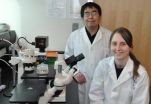(Press-News.org) Scientists from Monash University have uncovered a new understanding of how male puberty begins.
The key to their findings lies with a protein known as SMAD3 and the rate at which it is produced.
Researchers, Associate Professor Kate Loveland and Dr Catherine Itman from the Faculty of Medicine, Nursing and Health Sciences have discovered through laboratory testing that half as much SMAD3 protein results in faster maturation than the norm, and an inability to create SMAD3 results in abnormal responses to testosterone.
"SMAD3 is a protein that translates signals from the environment outside the cell to the nucleus, where it switches genes on or off," Dr Itman said.
"We have been investigating how SMAD3 influences the growth of testis cells and their ability to respond to testosterone".
Puberty begins when the body starts to produce large amounts of the hormone testosterone. Early, or precocious, puberty involves the onset of puberty before eight years of age and affects around 1 in 10,000 boys. On the other hand, puberty is delayed when testis cells cannot respond normally to testosterone. Altered timing of puberty has implications in adulthood, with precocious puberty linked to reduced adult height and delayed puberty associated with reduced bone density.
Testosterone acts through specialized cells in the testis called Sertoli cells. Before puberty, Sertoli cells multiply, allowing the testis to grow. At puberty, Sertoli cells must stop growing so they can support sperm precursor cells to develop into sperm.
Professor Loveland, Dr Itman and their colleagues have been investigating how Sertoli cells switch from a multiplying state, making the testis big enough to make sperm, to a mature state that sustains sperm production.
"We have discovered that this is not an "on-off" switch. Rather, it is the amount of the SMAD3 protein in the Sertoli cell that is different in the immature, multiplying Sertoli cell compared to the mature, adult cell".
The research identified that it is the amount of SMAD3 present that controls Sertoli cell activity prior to, or after, puberty. When SMAD3 levels are reduced, sperm develop earlier. When SMAD3 is absent, Sertoli cells take longer to respond to testosterone.
Previous research on puberty suggests that pubertal development is delayed in boys exposed to endocrine disrupting compounds, chemicals which impair cell responses to hormones. These chemicals are widely used in industry and in the manufacture of everyday items, such as plastics, cosmetics, paints and detergents.
Dr Itman is supported by a National Health and Medical Research Council (NHMRC) Early Career Project Grant to investigate how these hormone-disrupting chemicals in the environment affect the growth and maturation of Sertoli cells around puberty, including changes to SMAD3 levels and activity.
"We hope that through our research, we will inform decisions about the influence of chemicals in our environment on the timing of puberty in boys and on the fertility of adult men" Dr Itman said.
INFORMATION:
The findings were published in the international biomedical journal Endocrinology and can be downloaded at: http://endo.endojournals.org/cgi/rapidpdf/en.2010-1453v1
END
Alum is an adjuvant (immune booster) used in many common vaccines, and Canadian researchers have now discovered how it works. The research by scientists from the University of Calgary's Faculty of Medicine is published in the March 13 online edition of Nature Medicine. The new findings will help the medical community produce more effective vaccines and may open the doors for creating new vaccines for diseases such as HIV or tuberculosis.
"Understanding alum properties will help other vaccines because we are one step deeper into the mechanistic insight of adjuvants, ...
Research into how the brain transmits messages to other parts of the body could improve understanding of disorders such as epilepsy, dementia, multiple sclerosis and stroke.
Scientists at the University of Edinburgh have identified a protein crucial for maintaining the health and function of the segment of nerve fibres that controls transmission of messages within the brain.
The study, published in the journal Neuron, could help direct research into neurodegenerative disorders, in which electrical impulses from the brain are disrupted. This can lead to inability to ...
Research commissioned by Cerebra, the charity that helps to improve the lives of children with brain conditions, and carried out by the Cerebra Research Unit (CRU) at the Peninsula College of Medicine & Dentistry, has found little evidence to suggest that cranial osteopathy is of benefit to children with cerebral palsy.
The research is published on-line in the Archives of Disease in Childhood.
Osteopathy has, over recent years, become a popular complementary treatment for children with cerebral palsy. Cerebra initially asked researchers at the CRU to investigate existing ...
The first major study of the wellbeing and inclusion of former politically motivated prisoners in Northern Ireland will be launched by Queen's University today (Monday 14 March).
Ageing and Social Exclusion among Former Politically Motivated Prisoners in Northern Ireland and the border region of Ireland investigated the well being and social and economic inclusion of loyalist and republican former prisoners (aged 50 and over) as older people in Northern Ireland. The report will be launched at Parliament Buildings at Stormont this afternoon.
The research was led by ...
International climate negotiations are deadlocked between the affluent global North and "developing" South, between political Left and Right, and between believers and deniers. Now, authors writing in the latest issue of the International Journal of Water argue that a more integrative analysis of climate should help resolve these conflicts.
Land use changes and water management are highly relevant to climate change. To quote hydrologists Juraj Kohutiar and Michal Kravcik of the Slovak People and Water NGO: "Water evaporation is the most important agent of energy transformation ...
Potsdam/Bremerhaven, March 14th, 2011. Unusually low temperatures in the Arctic ozone layer have recently initiated massive ozone depletion. The Arctic appears to be heading for a record loss of this trace gas that protects the Earth's surface against ultraviolet radiation from the sun. This result has been found by measurements carried out by an international network of over 30 ozone sounding stations spread all over the Arctic and Subarctic and coordinated by the Potsdam Research Unit of the Alfred Wegener Institute for Polar and Marine Research in the Helmholtz Association ...
Calling it the "new periodic table for flies," researchers at North Carolina State University and collaborators across the globe have mapped the evolutionary history of flies, providing a framework for further comparative studies on the insects that comprise more than 10 percent of all life on Earth.
The research, published today in the online edition of Proceedings of the National Academy of Sciences, plugs gaps in the 260-million-year history of the fly order Diptera, says Dr. Brian Wiegmann, NC State professor of entomology and primary investigator of the fly tree ...
Electric cars are the future – a view shared by government and the automotive industry alike. The German federal government aims to establish Germany as the lead market for electromobility. By 2020, a million passenger cars with an electric drive should be on the roads in Germany. The prospects of achieving that aim look good: As the ADAC, the German motoring organization, found out in a survey, 74 percent of those surveyed would buy an electric car if they did not have to compromise in terms of cost, comfort and safety. Consumers are not willing to compromise one iota ...
Endoscopy has gone through amazing advancements in recent years. Microcameras on the tip of endoscopes supply images from the inside of the human body in ever higher resolution, which often makes it possible to identify tumors at an early stage. Endoscopes to date have some downsides, since they are expensive and, because of their multiple usages, have to be put through time-consuming and exhaustive cleaning procedures every time they are used. This problem might be solved by a new microcamera that the Fraunhofer Institute for Reliability and Microintegration (IZM) in Berlin, ...
The study analyzes the actions adopted by a dozen countries after suffering disasters similar to that of the Prestige, the oil tanker which sank off the coast of Galicia towards the end of 2002, provoking a spill of fuel-oil which turned out to be one of the biggest ecological disasters in the history of Spain. "We have seen that our country has not adopted technical nor legal preventative measures, as opposed to what happened in Germany with the shipwreck of the Pallas, for example, which produced a movement of a centralizing nature, in detriment to the federal spirit ...



